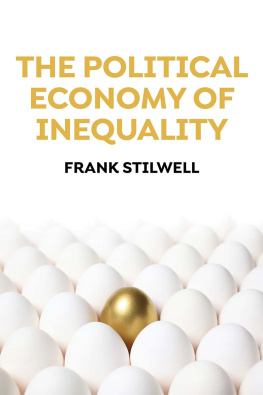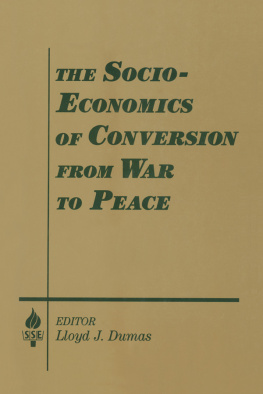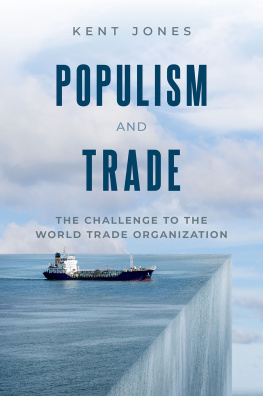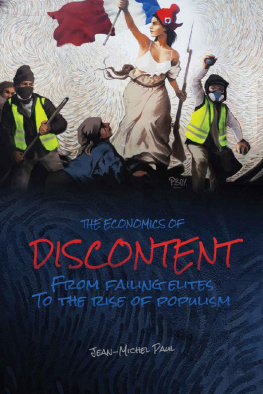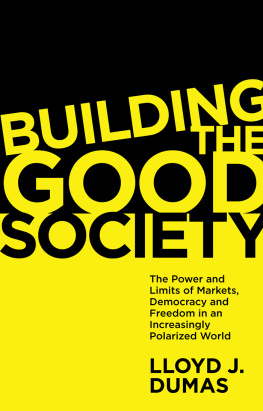POPULISM AND ECONOMICS
Chief Economist at TS Lombard, Charles Dumas is one of the world's leading macroeconomic forecasters. His previous books include Globalisation Fractures (2010) and The American Phoenix (2011).
ALSO BY CHARLES DUMAS AND PUBLISHED BY PROFILE
The American Phoenix: And Why China and Europe Will Struggle After the Coming Slump (2011)
Globalisation Fractures: How Major Nations Interests are Now in Conflict (2010)
China and America: A Time of Reckoning (2008)
The Bill from the China Shop: How Asias Savings Glut Threatens the World Economy (2006)
POPULISM AND ECONOMICS
Charles Dumas

First published in Great Britain in 2018 by
Profile Books Ltd
3 Holford Yard
Bevin Way
London WC1X 9HD
www.profilebooks.com
Copyright TSL Research Group Limited, 2018
The moral right of the author has been asserted.
All rights reserved. Without limiting the rights under copyright reserved above, no part of this publication may be reproduced, stored or introduced into a retrieval system, or transmitted, in any form or by any means (electronic, mechanical, photocopying, recording or otherwise), without the prior written permission of both the copyright owner and the publisher of this book.
A CIP catalogue record for this book is available from the British Library.
eISBN 9781788162265
List of figures
Gross world saving, % of GDP (GWP)
Japanese private saving, % of GDP
Japanese and Asian Tigers, current-account balance
EA current account balances, $ billion
Shares of Chinese GDP, %
World gross saving and real US Treasury yields
US output/hour-worked, non-farm business, period averages, %
Growth of real net capital stock, % pa, 7-yr moving average
Gross world saving, excl. China, % of GDP
US real gross capex on construction, 2009 = 100
Tech-product price deflation official estimates and revised view
Major countries GDP and personal disposable income growth, per capita, pre- and post-euro
Gini coefficient of inequality, %
US mean household income by fifths
US median household income by educational attainment
Top 1% income
Top 1% wealth
Certain private and public flows, % of GDP, 2015 90
20-year averages of growth and capex
Japan: real FX rate and export market share
Export performance vs target markets, 1992 = 100 95
Real FX rates, 19732017 average = 100
Chinese growth slowdown achieved, but debt escalated
Chinese non-financial companies, net income as % of total assets
Chinese non-financial debt, % of GDP
Real GDP growth, % YoY, with TS Lombard recalculation
Steadily less reliance on monetary growth since the crisis, %
Current account balances, $ billion
EA car sales, monthly
EA retail volume, 2010 = 100
North-central Europe (NCE) and other GDP, $ billion, 2016 current prices
Real GDP, 2008 Q1 (pre-crisis peak) = 100
Relative unit labour costs, long-run average = 100
Labour-force growth, % pa, actual vs forecast
Savings-glut current accounts, % of world GDP 126
Real FX rates, producer-price basis, long-run average = 100
Introduction: neo-Luddite discontents
Here we are, a quarter-century after the end of history, contemplating a possible end to the new world order, while large swathes of middle-income jobs are being taken over by robots.
The decisive discrediting and collapse of communism in 198991, with the dissolution of the Soviet Union, appeared to sanctify the world economic order based on democracy and free markets. It left the United States as the sole effective superpower. A blend of capitalism and democracy seemed the ideal political and social system, ending history. Yet the resulting globalisation, with increasingly free worldwide trade and capital movements, and rising migration flows, was followed within seventeen years by the worst financial and economic crisis since the 1930s Great Depression (that in turn had spawned World War II). And that crisis is now followed by the apparent disavowal by the United States itself of the system in which it has been paramount.
Equally paramount have been US firms and interests in generating the hi-tech revolution that has during that same quarter-century transformed the way we all live, with great benefit to aggregate human welfare and potential. But hi-tech effects on jobs, lifestyles and the distribution of wealth and income have been an important source of US discontents arguably more important than globalisation. As China develops its own tech sector, the role of hi-tech in undermining traditional jobs in advanced countries will increasingly predominate over low-wage emerging-market competition. Nonetheless, hi-tech being home-grown for Americans, their politicians prefer blaming the rise of China, rather than hi-tech. Yet we are nowhere near the end of the story when it comes to jobs rendered obsolete by automation and robots.
What these discontents and problems should remind us of is not often raised in economic texts and analysis. Supposedly it was Winston Churchill (always a risky man to quote) who said: democracy is the worst system of government except all the others. To this truth might be added: capitalism is the worst system of economics except the alternatives. Crucially, both democracy and capitalism, as systems, come under the heading of least bad, rather than best (or even particularly good). Seeking heaven on earth generally creates hell, as centuries of experience of religious and more recently communist rule have reminded us.
This book is chiefly about the problems that have arisen for the democratic parts of the world as a result of the peculiarities of global capitalism. To a modest degree it is also about what we should do about it.
Hi-tech and globalisation have reinforced one another. How could huge swathes of hi-tech jobs have been established in Bangalore, India (rather than the US), were not that same hi-tech available to transmit the services around the world? How could international supply chains be tuned up to the refined, just-in-time discipline of modern production flows and supply chains without hi-tech?
This confluence of massive change has been completed by the global savings glut more accurately, the Eurasian structural excess of saving in Germany, the countries surrounding it to the north, west and south, plus China, Japan and the Asian Tigers. This vast section of the world economy can only sustain its saving addiction if other countries or sectors run deficits and/or raise their debt levels. Both the financial crisis itself and its successor, the euro crisis as well as the sluggish subsequent global recovery, were clear results of these deficits and debts. In the (non-)recovery, deficit-country belt-tightening reinforced the shortage of demand that is the very nature of a savings glut.
This book will describe how this turn of events arose, explaining and putting in context the discontents expressed by the Brexit vote and subsequent British general election, and the November 2016 election of President Trump. It continues from the series of books I wrote before, during and after the crisis, broadly relating it to global financial imbalances. But here we go beyond those earlier analyses by interrelating the effects of globalisation and its imbalances with the forces of technology in both its beneficial and its threatening aspects and demographic shifts.
Only by understanding the interplay between the four key elements globalisation, technology, demography and imbalances can recent events be fully analysed, and future consequences, along with desirable policy changes, be described. This book continues a series that started with the 2006 publication of
Next page

